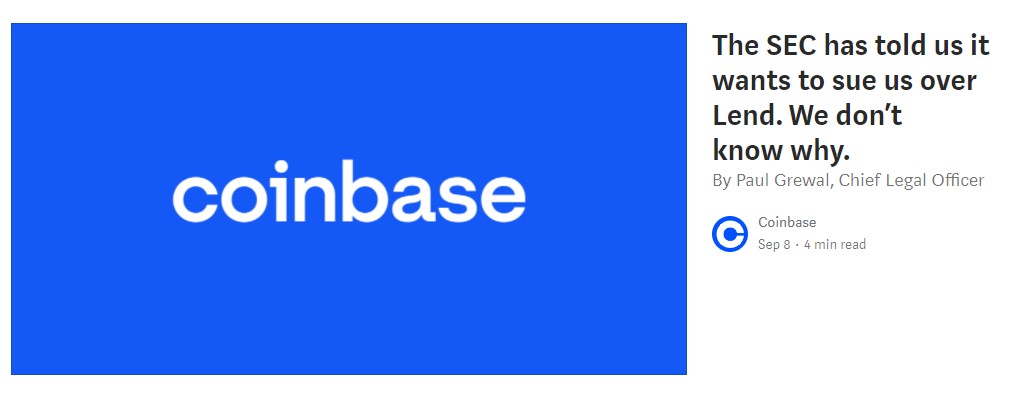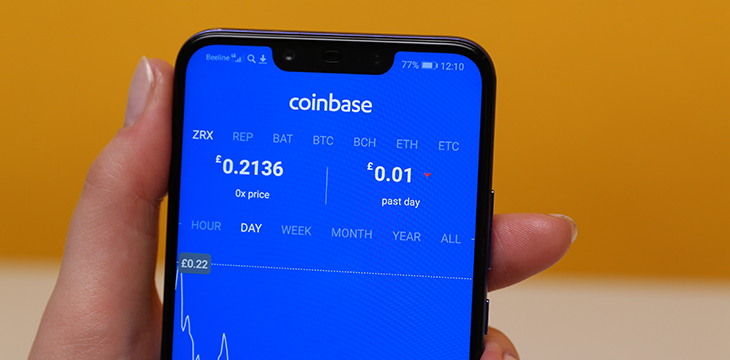|
Getting your Trinity Audio player ready...
|
The U.S. Securities and Exchange Commission (SEC) has warned Coinbase (NASDAQ: COIN) that it will take enforcement action if the planned launch of Coinbase Lend goes ahead, the company admitted in a blog post Wednesday. According to Coinbase, the SEC served it with a Wells notice—a formal letter sent by the SEC to notify people or firms that it has concluded they are in violation of securities laws and is intending to bring an enforcement action against them.

Coinbase Lend was set to allow users to lend out their USDC to borrowers to earn interest on the principle. The product was set to launch later this month, but the SEC’s notice makes that impossible to do compliantly.
The blow to Coinbase comes following comments by SEC chair Gary Gensler in August, where he lamented the lack of investor protection in digital currencies. The securities regulator took action against three digital asset companies shortly after, showing that the SEC was serious about its statements. It would seem that products like Lend are exactly the sort of digital asset products that leave investors highly vulnerable if not controlled by regulation; according to the Coinbase Lend website, the principle lent by users is guaranteed by Coinbase, but given the company’s non-existent customer service, the SEC would be concerned should have been entirely predictable.
Not if you’re Coinbase, apparently. In the blog post announcing the notice, Coinbase Chief Legal Officer Paul Grewal claimed that despite spending months engaging with the SEC regarding Lend, they have ‘no idea’ what the SEC’s concerns are. Grewal said Lend doesn’t qualify as a security ‘because it’s not an investment contract or a note’. Similarly, CEO Brian Armstrong launched a 21-part Twitter tirade targeted at the SEC, wondering aloud how Lend can be a security: “how can lending be a security?”
1/ Some really sketchy behavior coming out of the SEC recently.
Story time…— Brian Armstrong (@brian_armstrong) September 8, 2021
The idea that both the CEO and lawyer of a publicly listed company like Coinbase (NASDAQ: COIN) would air their regulatory grievances in this way would be funny by itself, but the posts show that neither Armstrong nor Grewal have any idea about (or interest in) the U.S. securities regime.
Contrary to Armstrong’s understanding, U.S. securities laws exist to govern exactly things like lending and has been a key focus of the regime for a long time before digital assets were a live issue.
Grewal, however, is wrong in a more interesting way: he says that Lend is not a security because it is not an investment contract or a note. Investment contracts are only one type of security, and while investment contracts often come up in the digital asset context (you’ve probably heard of the Howey test for determining whether something qualifies as an investment contract), something may be deemed a security in a range of other contexts, some of which are more directly applicable to Coinbase Lend than any Howey analysis.
Most significantly, Gensler intimated in July that the SEC considers stablecoins that are backed by securities to amount to securities themselves:
“Make no mistake: it doesn’t matter whether it’s a stock token, a stable value token backed by securities, or any other virtual product that provides synthetic exposure to underlying securities.”
Given that Lend is based on USDC, and USDC’s reserves breakdown show that the stablecoin is backed almost entirely by securities, and the lending of securities most definitely is caught by the U.S. securities regime, it would appear that Gensler and the SEC confirmed that Lend was non-compliant months ago: Grewal and Armstrong simply missed the hint.
But this also means that the significance of the SEC’s decision here might actually stretch far beyond just Lend. The SEC has yet to confirm what the specific reason for their determination is, but assuming they are sticking to their word by beginning to treat stablecoins based on securities as securities themselves, it seems likely that Lend is just the first non-compliant product to get nixed by regulators. Though nobody knows exactly what Tether is backed by, it’s certainly not cash and almost certainly securities-based. How long before Tether gets a letter?
More broadly, there are projects across the industry that will be nervously watching the SEC kick into gear to go after Coinbase. Ethereum 2.0 is the next elephant in the room. Under proof-of-stake, there’s a legitimate case to be made that ETH is a security if it wasn’t already. It’s only a matter of time until the SEC provides a definitive answer on this question, and in the time since 2.0 was implemented, the regulator has only grown more active.
For Coinbase’s part, execs spent August and the start of September dumping $245 million worth of stock on the market (the SEC first told Coinbase that Lend likely involved a security in June at the latest, and had a Coinbase employee in to provide sworn testimony in August). Armstrong’s exasperated complaints that the SEC didn’t keep him in the loop show how out of touch they are with the laws and regulation which apply to them. It’s as if he thinks that the U.S. securities regime exists solely to impede the brilliance of him and crypto executives like him, rather than being a well-established body of law, developed cautiously over time to ensure that investors are protected from illegitimate or dangerous enterprises. In that sense, Armstrong may not be entirely wrong.
Follow CoinGeek’s Crypto Crime Cartel series, which delves into the stream of groups—a from BitMEX to Binance, Bitcoin.com, Blockstream, ShapeShift, Coinbase, Ripple and Ethereum—who have co-opted the digital asset revolution and turned the industry into a minefield for naïve (and even experienced) players in the market.

 02-21-2026
02-21-2026 




